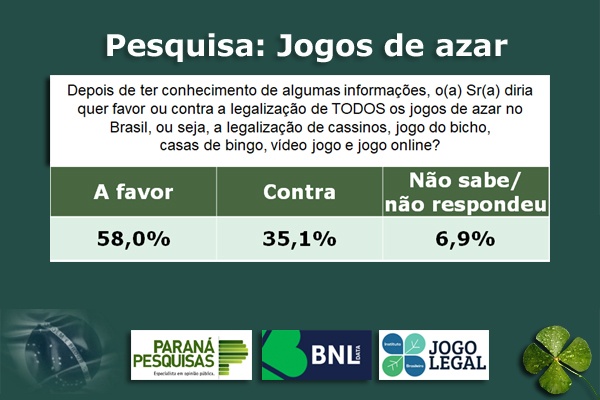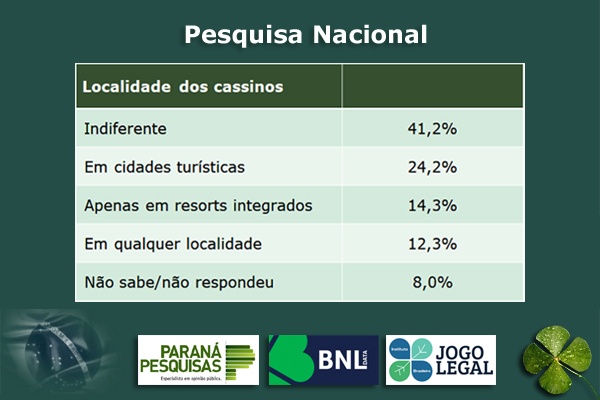
The legalization of gambling will return to the Judiciary and Legislative agenda. The Judiciary will address the issue through the judgment by the Supreme Federal Court of Extraordinary Appeal (RE) 966.177, with recognized general repercussion (Theme 924). The merit judgment of RE 966.177, which will be judged April 7, was filed by the Public Ministry of Rio Grande do Sul against the judgment of the Criminal Appeals Panel of that State, wich understood the criminalization of the conduct of gambling would not find validity in current constitutional order.
In Legislative, Senator Angelo Coronel (PSD-BA) should present in April his report as a substitute for PLS 2648/19 in the Senate’s Committee on Regional Development and Tourism – CDR. The proposal by Senator Roberto Rocha (PSDB-MA) legalizes casinos in installed resorts, but the rapporteur defends legalization of all modalities in preview of his report.
“Paraná Pesquisas” Survey
Hired by the news portal BNLData, in partnership with the Brazilian Institute for Legal Gaming – IJL, Paraná Pesquisa consulted 2,086 Brazilians through telephone interviews between March 15th to 19th to get to know the national public opinion about the legalization of gambling. The representative sample of Brazil reaches a 95% confidence level for an estimated error margin of approximately 2% for the overall results.
The search was conducted with objective of consulting population about the legalization of gambling, such as casinos, “jogo do bicho”, bingo, video games (slot machines) and online games, by the National Congress.
Majority is favorable of legalization gambling

Paraná Pesquisa presented interviewees the economic advantages of legalization gambling such as job creation, increased tax collection and gains from grants for the implementation of gaming houses. After taking note of this information, the interviewees’ position regarding the legalization of all games of chance in Brazil was 58.0% in favor, 35.1% against and 6.9% don’t know / didn’t answer. Men (65.4%) with secondary education (61.4%), economically active population (60.2%) in the North / Central West Region (61.3%) were the most favorable the legalization of all modalities.
Opinions on legalization of each modality were also consulted separately: casinos, “jogo do bicho”, bingo hall, video games (slots machines) and online games
Legalization of casinos
The only modality registered disapproval from the population – with little difference – was the legalization of casinos. Despite the slight disapproval bias, the numbers show that society is divided, especially if we consider the margin of error of 2%: 46.1% are against the return of casinos, 45.5% in favor and 8.4% don’t know / didn’t answer. Women are more resistant legalization of casinos. Only 35.4% of them are favorable this modality. Unlike men, whose majority approves the return: 56.9% want the casinos to return. Regarding education, 53% of respondents with higher education are favorable.
Indifferent as to the location of casinos

The survey also consulted where casinos should be installed, if they were legalized. Most are indifferent to the locations where the casinos would be installed for 41.2% interviewees, for 24.2% they should be located in tourist cities, for 14.3% only in integrated resorts, 12.3% in any location and 8% don’t know / didn’t answer. Indifferent as to the location of the casinos.
In another research conducted out in May 2019 by ‘Paraná Pesquisa’ with federal deputies, it indicated at that time that 52.1% of parliamentarians were in favor of legalizing all modalities, with only 7.2% having a preference for casinos’ only in integrated resorts’. In other words, another survey topple myths about preference for legalization of casinos in integrated resorts.
Legalization “jogo do bicho”
Most interviewees Brazilians defend the legalization “jogo do bicho”, with 47.8% favorable, 46.1% against and 6% don’t know / didn’t answer. Men (57.3%), with higher education (51.4%), economically active population (49.6%) in the North / Central West Region (50.6%) are the most favorable the legalization “jogo do bicho”.
Paraná Pesquisas also asked if the interviewees believed “jogo do bicho” was related to criminality. For 53.4% the activity is not related and 46.6% answered yes. The survey of those who believe crime could increase or decrease with the legalization “jogo do bicho” indicated that 43.5% believe it will decrease, 25.2% it will increase and 31.3% don’t know / didn’t answer.
Legalization bingos halls
About the return of bingos halls, 50.8% respondents are favorable, 43.1% against and 6.1% don’t know / didn’t answer. Again, men (60.6%), with higher education (58.5%), economically active population (53.1%) in the North / Central West Region (55.9%) are the most favorable the legalization of bingo halls.
Legalization video games (slot machines)
Another modality had a favorable result was the video game, with 48.8% favorable of legalization, 43.7% against and 7.5% don’t know / didn’t answer. Men (59.6%), with higher education (54.5%), economically active population (51.8%) in the North / Central West Region (51.9%) are the most favorable the legalization of video games.
Legalization online gambling
Legalization of online gambling obtained the highest approval rate in the survey, with 48.8% favorable, 43.7% against and 7.5% don’t know / didn’t answer. Again, men (63.9%), with higher education (61.8%), economically active population (56.9%) in the North / Central West Region (56.9%) are more favorable the legalization of online gambling. Responsible for the high approval rate of online gambling were young people with aged 16 to 24 years old, with a high percentage of 73.5%.
Summary of modalities

Job creation

Asked ‘If games were to be legalized in Brazil, in your opinion, would that generate many jobs?”, The survey pointed the absolute majority interviewees with 74.5% believe that yes, 17.0% no and 8.5 % don’t know / didn’t answer. Men (81.1%) aged 35 to 44 years (78.9%), with higher education (78.5%), economically active population (77.4%) in the Southeast Region (75.1%) are who most believe wich the legalization of gambling would generate many jobs.
Emergency aid during the Covid-19 pandemic

The survey also consulted interviewees about the fact some deputies and senators advocated the legalization of gambling in Brazil as an alternative source for paying emergency aid during the Covid-19 pandemic. Again, the majority interviewees with 56.8% are favorable initiative, 35.9% are against it and 7.4% don’t know / didn’t answer. Again, men (61.4%) aged 16 to 24 years (62.0%), with higher education (59.8%), economically active population (58.4%) in the North / Central West Region (60.0%) are those who most believe this possibility.
***
Methodology
The following we present the results of public opinion survey carried out in Brazil with the objective of consulting population on the legalization of gambling.
The universe this research covers the Brazilian population. To conduct this research, a sample of 2086 inhabitants was used, which was stratified according to sex, age group, education, economic level and geographical position. The data collection work was done through telephone personal interviews with inhabitants aged 16 or over in 26 States and the Federal District and in 194 Brazilian municipalities from March 15 to 19, 2021, 20.0% of the interviews were audited simultaneously with their realization.
Such a representative sample from Brazil reaches a 95.0% confidence level for an estimated error margin approximately 2.0% for the overall results. In analysis the questions by location, the confidence level reaches 95.0% for a margin of error of 3.5% for the stratum of Southeast Region where 898 interviews were carried out, 4.0% for the stratum o of Northeast Region where they were 559 interviews were carried out, 5.5% for the stratum of North Region + Central West where 320 interviews were carried out and 5.5% for the stratum of South Region where 309 interviews were carried out Paraná Pesquisa is registered in Regional Council of Statistics of 1st, 2nd, 3rd, 4th, 5th, 6th and 7th Region under nº 3122/20.
The sample is representative residents of the areas surveyed and was selected in two stages. In the first stage, a probabilistic draw was carried out for the municipalities where the interviews were conducted using the PPT (Probability Proportional to Size) method, considering the population aged 16 or over in the municipalities as basis for this selection. In the second stage, the selection of interviewees within municipality was made using proportional sample quotas, according to the following variables: gender, age group, education and economic level.